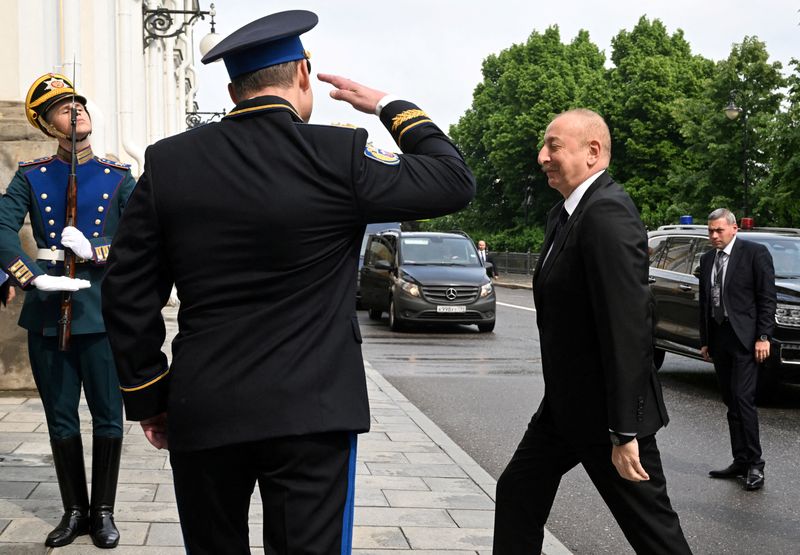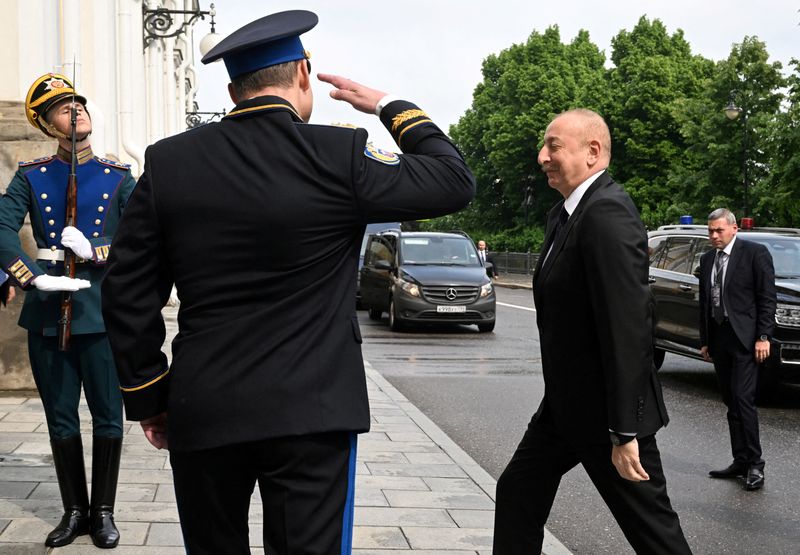By Andrew Osborn
(Reuters) -Early on September 19, Azerbaijan's president set in motion a lightning-fast military plan months in the making that would redraw the geopolitical map and avenge an ignominious defeat suffered by his father some 30 years before.
In power for two decades and with one successful war already under his belt, President Ilham Aliyev had often spoken of returning the mountainous Nagorno-Karabakh enclave to Azerbaijan's full control after its ethnic Armenian inhabitants broke from Baku's rule in the early 1990s.
Now, a confluence of factors had convinced Aliyev, 61, that the time was right, Elin Suleymanov, Azerbaijan's ambassador to Britain, told Reuters.
"History takes turns and zigzags," Suleymanov said. "We could not do this earlier and it would probably not be a good idea to do it later."
"The stars aligned for certain reasons and President Aliyev saw the alignment," said Suleymanov, who previously worked in Aliyev's office.
Prominent among these "stars" was the new inability or unwillingness of Russia, the West, or Armenia to intervene to protect Nagorno-Karabakh. The self-governed enclave had 10,000 fighters at its disposal according to Azerbaijan, whose own army - estimated at over 120,000-strong by Western experts - dwarfed it.
In conversations with Reuters, two senior officials and a source who has worked with Aliyev underscored that the decision to take back the breakaway region took shape over months as diplomatic realities shifted.
It was also deeply personal for the president, they said.
Speaking to the people of Azerbaijan the day after his troops had gone in, Aliyev said he had ordered his soldiers not to harm civilians. Baku would later say that 192 of its soldiers had been killed in the operation that followed; the Karabakh Armenians that they had lost over 200 people.
"President Aliyev is completing something that his father could not do because he ran out of time," said one of the sources, who requested anonymity because they were not authorised to give comments to the media.
Aliyev's actions have loosened Russia's decades-long grip on the strategically important South Caucasus region which is crisscrossed with oil and gas pipelines, lies between the Black and Caspian seas, and borders Iran, Turkey and Russia.
In three interviews, one before and two after the military operation, Aliyev's foreign policy adviser Hikmet Hajiyev said Baku's patience with the status quo had snapped.
Less than two weeks before Azerbaijani forces swept into Karabakh, Hajiyev told Reuters that Baku was not seeking any military objectives "at this stage" but remained vigilant. It could not accept what he called a "grey zone" with Karabakh's own armed security forces, which he likened to the mafia, on Azerbaijani territory, he said.
The Karabakh defence force has since disbanded under the terms of a new ceasefire deal, but they have rejected Azerbaijani criticism in the past, calling themselves a legitimate fighting force.
On the day of the military operation, after fighting abated, Hajiyev listed what he called "triggering elements" that prompted Baku to resort to military action, mentioning a landmine explosion that killed two Azerbaijani civilians earlier that day in part of Karabakh recaptured in a 2020 war.
"Enough is enough," Hajiyev said.
Aliyev also referred to the mine attack, and a similar incident which had killed four others. Karabakh Armenians called the assertions an "absolute lie." Reuters was unable to independently verify what had happened.
In the event, Russia, which has peacekeepers on the ground but is busy with its own war in Ukraine, stood to one side.
Hajiyev said Azerbaijan gave the Russians "minutes' notice" before the operation began.
Nikol Pashinyan, prime minister of neighbouring Armenia, which twice fought major wars over Karabakh, did not heed calls from opposition politicians to intervene and said his country needed to be "free of conflict" for the sake of its own independence.
The West - which had previously tried to mediate - merely urged Aliyev to halt his operation and was duly ignored.
Pashinyan went on to harshly criticise Russia for not doing enough to avert the crisis. On a conference call last week, the Kremlin denied its peacekeepers should have intervened.
Russia's foreign ministry added he was making "a massive mistake" and accused him of trying to destroy Armenia's centuries-old ties with Moscow.
WINDOW OF OPPORTUNITY
Trouble had been brewing for months.
With Russia distracted in Ukraine, Aliyev appeared to sense a window of opportunity.
In December last year, Azerbaijani citizens describing themselves as environmentalists unhappy about illegal mining began to block the Lachin corridor, the only road linking Karabakh to Armenia.
Karabakh officials at that time said the protesters were a front and included Azerbaijani officials. Baku denied the accusation.
Apparently reluctant to risk escalation, armed Russian peacekeepers did not act to remove the protesters by force.
In June, citing a shooting incident, Azerbaijan blocked the corridor, stopping transport including the passage of humanitarian aid. It only allowed medical evacuees out, a step that deepened Karabakh's food and medicine shortages.
Armed border guards manned a checkpoint close to a base for the Russian peacekeepers, who again did not intervene. Baku ignored calls from Washington and Moscow to unblock the road, citing a weapons-smuggling risk.
In May, in an attempt to advance peace negotiations, Armenian Prime Minister Pashinyan made what looked like a breakthrough offer: Armenia was ready to recognise Karabakh as part of Azerbaijan, if Baku guaranteed the security of its ethnic Armenian population.
Aliyev appears to have seized on what he saw as a long overdue admission of reality as a sign of weakness. The source who has worked with Aliyev called the shift "very important."
"After Armenia recognised Karabakh as an integral part of Azerbaijan, what status can the criminal regime that has been calling the shots in Karabakh for 30 years have?," Aliyev told Azerbaijanis in his victory speech last week.
On the same day, the Russian foreign ministry accused Pashinyan of sowing the seeds of Karabakh's demise as an ethnic Armenian enclave by recognising it was part of Azerbaijan. That, it said, had changed "the situation" for Russia's own peacekeeping contingent.
UNFINISHED BUSINESS
Karabakh slipped from Azerbaijan's grasp in the chaos that followed the Soviet Union's breakup. In a 1988-1994 war, around 30,000 people were killed and over 1 million displaced, over half of them Azerbaijanis.
Aliyev's father, then President Heydar Aliyev, was forced to agree to a ceasefire that cemented Armenia's victory.
Ilham, who had succeeded Heydar on his death in 2003, signed an oil deal with a BP-led consortium a year later that gave Azerbaijan funds to start building a modern army.
More recently, Azerbaijan benefited financially from the West's decision to cut energy purchases from Russia. The European Commission last year agreed to double imports of Azerbaijani natural gas by 2027.
For years, Moscow's alliance and defence pact with Armenia - where it has military facilities - deterred Baku from using force even as Russia sold weapons to both sides.
But Moscow's ties with Armenia began to sour in 2018 when Pashinyan, a former journalist, led street protests that brought him to power at the expense of a long line of pro-Russian Armenian leaders.
And as Azerbaijan's army overhaul and modernisation drive intensified, Armenia limped from crisis to crisis.
Seeing there was no love lost between Russian President Vladimir Putin and Pashinyan, who had spoken in favour of ties with the West, Aliyev tested the waters. In 2020, he launched a 44-day war that his army won - with the help of advanced Turkish drones, clawing back a chunk of Karabakh.
Russia brokered a ceasefire that appeared to be a win for Moscow, allowing it to deploy nearly 2,000 Russian peacekeepers to Karabakh. The step gave it a military footprint in Azerbaijan, an apparent buffer against further Azerbaijani military action.
Then Russia's full-scale invasion of Ukraine in February 2022 changed the equation again, drawing Moscow into a war of attrition with Kyiv.
FOG IN THE AIR
On the morning of Tuesday, Sept. 19, residents of Stepanakert, Karabakh's capital and known as Khankendi by Azerbaijan, heard loud and repeated artillery fire as fog hung in the air.
What Aliyev called an anti-terrorism operation had begun, with ground forces backed by drones and artillery sweeping in to overwhelm Karabakh's defensive lines.
At least five Russians were killed in the violence that followed, in an apparent accident which Aliyev apologised to Putin for.
Within 24 hours, Baku declared victory and the Karabakh Armenian fighters agreed to a ceasefire that obliged them to disarm.
Karabakh Armenians said they felt betrayed on all sides.
"Karabakh has been left on its own: Russian peacekeepers practically don't fulfil their obligations, the democratic West turned away from us, and Armenia also turned away," David Babayan, an adviser to the leader of the Karabakh administration, complained to Reuters a day after the rout.
Babayan has since given himself up to the Azerbaijani authorities, he announced on Telegram. The administration he advised has announced its own disbandment.
"Azerbaijan regained its sovereignty at around 1:00 p.m. yesterday," Aliyev told the nation.
Four days after the operation, some of Karabakh's 120,000 Armenians began what became a mass exodus by car towards Armenia, saying they feared persecution and ethnic cleansing despite Azerbaijani promises of safety. Ten days after Azerbaijan struck, 98,000 people had fled into Armenia, the authorities there said.
"This is one of the darkest pages of Armenian history," said Father David, a 33-year-old Armenian priest who came to the border to provide spiritual support for those arriving. "The whole of Armenian history is full of hardships."

For Azerbaijan, Karabakh's return paves the way for tens of thousands of Azerbaijanis who once fled it to go back, a promise Aliyev's father gave repeatedly.
"President Aliyev has delivered the testament of his father," said Suleymanov, the ambassador to Britain.
